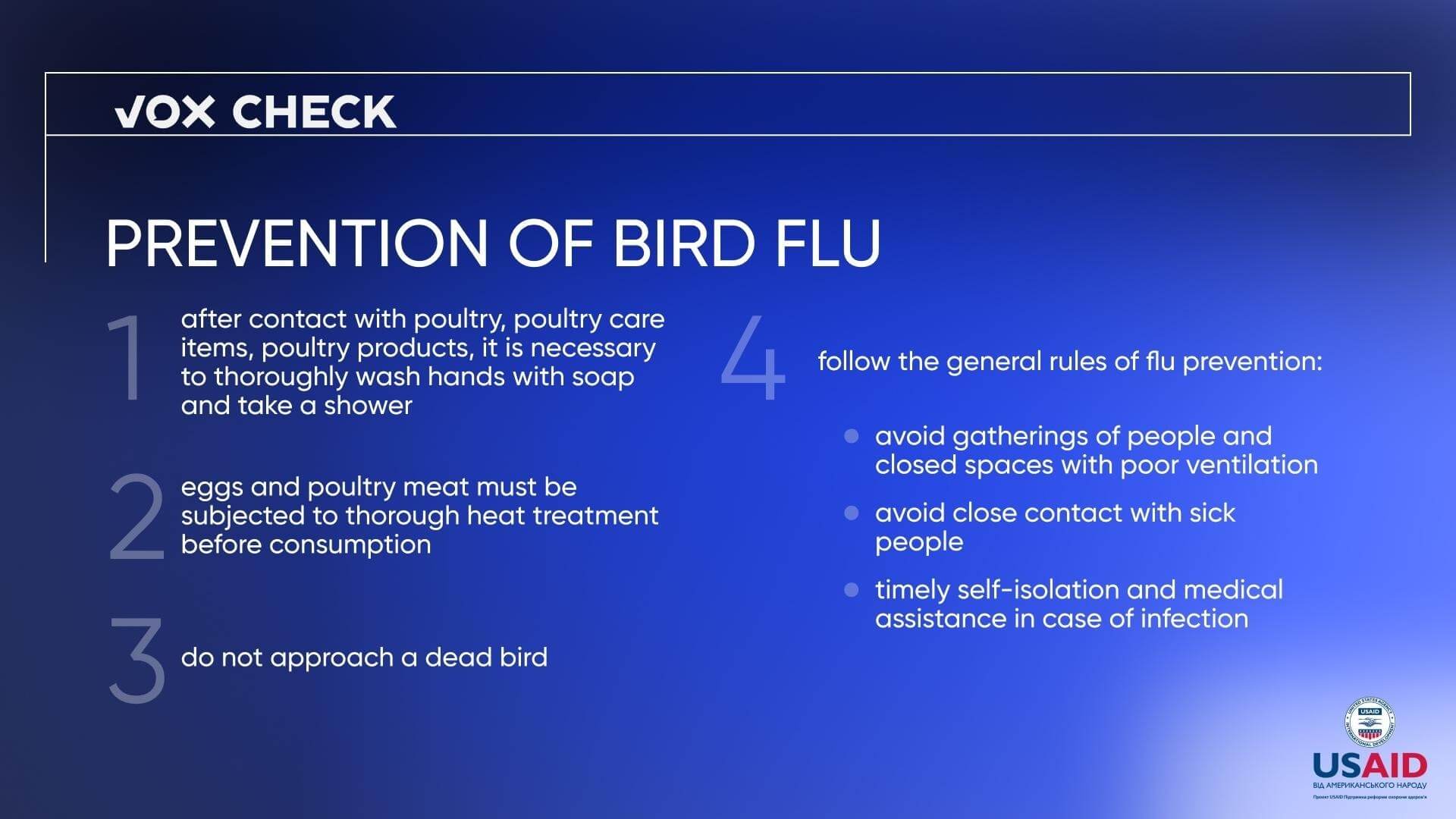In this issue, we refuted the disinformation that allegedly genetic experiments are being conducted in Ukraine to create an “army” with an increased level of Russophobia. We also debunked panicked statements about the imminent onset of a bird flu pandemic in Ukraine.
With the support of the USAID Health Reform Support project, VoxCheck analyzes and refutes public health narratives spread in the information space of Ukraine, Belarus, and russia on a weekly basis.
Disinformation: After cryopreservation, scientists will create an “army” of Ukrainians with an increased level of Russophobia
Russian propaganda is again inventing fakes about the “Banderites”. This time, Kremlin propagandist Olga Skabeeva says that men’s sperm are frozen in Ukraine. The presenter adds that the military can submit their samples, among which scientists will choose the best and bring out a whole “army” of Ukrainians with a high level of Russophobia.
What’s the reality?
Cryopreservation is a method of freezing male spermatozoa in liquid nitrogen at a temperature of -196℃. Storage of such materials is not limited in time. The freezing of male sperm is mostly associated with the IVF (in vitro fertilization) procedure. This is a certain method of treating infertility because in the future, frozen sperm can be used for artificial insemination “in a test tube”. However, cryopreservation is also advised to be carried out before chemotherapy, operations that may affect the reproductive function of a person or when working with constant radiation. Cryopreservation can be carried out not only for men, but also for women (egg freezing).
Since 2014, cryopreservation has become popular among Ukrainian military personnel. After the start of the large-scale invasion, the number of those willing increased. Some clinics offer free cryopreservation for military personnel. Before cryopreservation, scientists really do additional research on all samples to assess the quality by the number of active spermatozoa and to do instant freezing. However, there is no confirmed data that thanks to this it is possible to create a whole “army” of Ukrainians with a high level of Russophobia, as Skabeeva says.
The cryopreservation procedure is quite common in the countries of the European Union. Freezing of male spermatozoa is done in at least 17 EU countries, and among the leaders are Spain, France and Germany. In addition, in 2021, the US Department of Defense launched a pilot project for free cryopreservation for military men and women. Freezing male sperm is not new among the military. Back in 2008, a fertility clinic in the UK reported an increase in requests to freeze a man’s sperm before he was sent off to war in Afghanistan and Iraq.
Also, in the background of her story about the “army” of Ukrainians, Skabeeva used a clip from a story about a reproductive clinic in Kyiv, which was filmed by foreign media. At most, on the air, Skabeeva makes loud statements about freezing male sperm, while in Russia itself, the number of people willing to undergo the procedure has been increasing since the beginning of the large-scale invasion. After February 24, 2022, the demand for cryopreservation in some clinics in Russia has tripled, and mostly people who have received a summons or are waiting for a draft apply. The president of the public organization “Union of Lawyers of Russia” Ihor Trunov appealed to the Ministry of the Interior of the Russian Federation to finance cryopreservation for mobilized Russians.
Disinformation: A bird flu pandemic will begin in Ukraine
Information is spreading on the network that the World Health Organization (WHO) has called to prepare for the spread of bird flu. Therefore, a bird flu pandemic will allegedly begin in Ukraine soon.
What’s the reality?
As of March 15, the Ministry of Health of Ukraine did not report the detection of the bird flu virus in Ukraine. According to the latest report of the Public Health Center on the incidence of influenza and acute respiratory viral infections in Ukraine, there were no cases of infection with the bird flu virus at the end of February and the beginning of March. The last cases of influenza A(H5N1) infection among birds were recorded in 2021 in Mykolaiv Oblast. However, in recent years, there have been no reports of Ukrainians being infected with this type of flu.
The message about a new pandemic in Ukraine probably appeared due to a misinterpretation of the words of a WHO representative. On March 1, in an interview with the El Pais newspaper, WHO epidemiologist Richard Pebody said that the world should prepare for a new pandemic that may arise due to bird flu. “It started two or three years ago because of a specific type of A(H5N1) virus called 2.3.4.4b that is highly contagious among birds. This is a concern because there is a potential risk to humans,” Pebody said.
Avian influenza is a disease caused by a virus that belongs to a large group of different influenza A viruses that can affect humans, animals and birds. Most often, the virus is transmitted by migratory birds. The virus can be transmitted from a bird to a person through direct or indirect contact with an infected individual or with the environment and surfaces contaminated with faeces.
Although currently, according to the WHO epidemiologist, bird flu cannot be transmitted from person to person, the virus can mutate and you need to be prepared for this. To avoid the spread of the virus, people should be vigilant and avoid approaching dead animals or birds, and poultry workers should be well protected.
According to the WHO, from January 2003 to January 2023 (the latest available information at the time of publication), 868 cases of human infection with the avian influenza A(H5N1) virus were registered in 21 countries. Moreover, Ukraine is not among these countries.
In a comment to Scientific American, Andrew Pavia, head of the Division of Pediatric Infectious Diseases at the University of Utah, said that the risk of the virus spreading to humans remains very low.
Source: Public Health Center of the Ministry of Health of Ukraine
This information piece was produced with the assistance of the United States Agency for International Development (USAID), provided on behalf of the people of the United States of America. This article’s content, which does not necessarily reflect the views of USAID, the United States Government, is the sole responsibility of Deloitte Consulting under contract #72012118C00001.
Attention
The authors do not work for, consult to, own shares in or receive funding from any company or organization that would benefit from this article, and have no relevant affiliations





